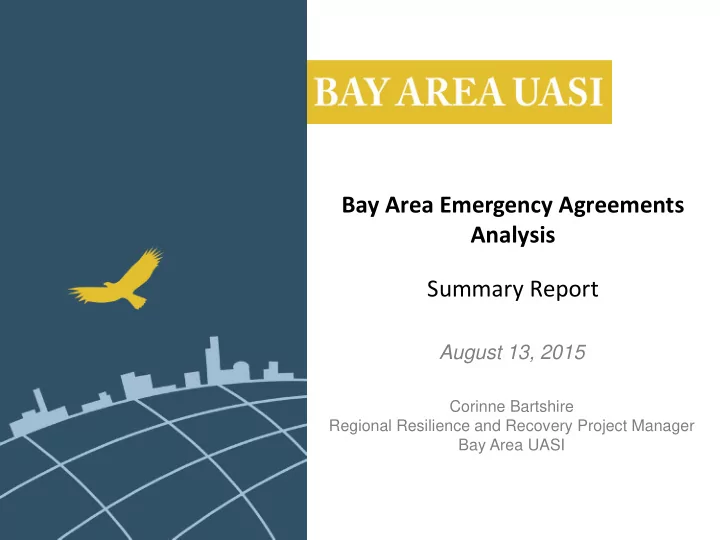

Bay Area Emergency Agreements Analysis Summary Report August 13, 2015 Corinne Bartshire Regional Resilience and Recovery Project Manager Bay Area UASI
Purpose Background Bay Area Regional Catastrophic Earthquake Plans 2013 Tabletop Exercise Series No prior research on emergency agreements Potential for shortage of resources Infrastructure systems core capability is top of the risk and gap list Goal To evaluate the extent of overlapping emergency agreements in the Bay Area region.
Critical Lifelines Focus Electrical Power Transportation System and and Debris Water System Communication Partnerships Fuel Removal Distribution
Vendor Summary
Interview Summary •Overlapping contracts •Restoration priorities •Biggest concern: with AshBritt have been outlines coordination and Environmental are held with PG & E communication by three jurisdictions. between service •Fuel availability vs providers accessibility •Bottled/ potable water Transportation Electrical Power and Debris System and Fuel Water System Removal Distribution Additional •Connectivity •Discussion of big box California Master Mutual Aid • stores •Responsibility of Agreement (CMMAA) restoration falls on •Local resources • Discussions about emergency service providers •Schools Procurement •Providers serves as • Inter-jurisdictional communication liaisons in the EOC Partnerships Communication
Key Findings “Pool of Vendors” • Intended Use vs Guaranteed Use • Vendor Management methods Documentation Centralization • Longevity of Preventative Planning • Nebulous Ownership Relationships and Partnerships • Flexibility and personalization • Comfort fallacy
Recommendations Further document emergency agreements Additional discussions regarding ownership / management of agreements Role of OES Process for activating / using emergency agreements Execute RCPT recommendations Consider one critical lifeline per year Achieve tangible outcomes Invite key decision makers to finalize agreements
Questions
Recommend
More recommend